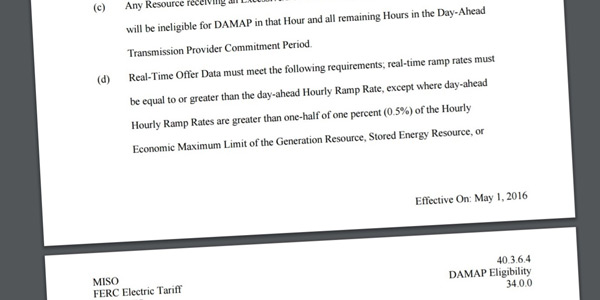By Amanda Durish Cook
CARMEL, Ind. — MISO will file with FERC to correct a recently uncovered eight-year-old Tariff mistake related to the RTO’s day-ahead margin assurance payment.
The RTO has found that Module C of its Tariff contains language saying that any resource that incurs an excessive or deficient energy deployment charge during one hour will be “ineligible for [day-ahead margin assurance payment] in that hour and all remaining hours in the day-ahead transmission provider commitment period.”
The problem: MISO prohibits the receipt of the day-ahead margin assurance payment only for the hour in which the resource incurred the charge; it does not observe an hours-long disqualification. The Business Practice Manuals limit payment ineligibility to the single hour the charge was incurred. A longer disqualification would restrict dispatch flexibility, the RTO said.
Despite the discrepancy between the Tariff and manuals, settlements have reflected guidelines in the latter since the beginning of MISO’s ancillary services market in 2009, said Jeff Bladen, executive director of market design. The erroneous language does not represent current or historical practice, Bladen said, and the error is not repeated in BPM language or MISO training manuals.
“The practice described in the Tariff was neither the intended method nor has it ever been used by MISO before or since 2009,” Bladen said at a March 9 Market Subcommittee meeting.
MISO will submit a Section 205 filing with FERC to remove the Tariff language and payment eligibility will carry on as usual, Bladen said.
“MISO immediately reported the issue to the FERC Office of Enforcement,” Bladen said. The error was uncovered during “unrelated” Tariff research.
Bladen said neither MISO nor its Market Monitor support resettlements, and no gaming was discovered.
David Sapper of Customized Energy Solutions asked what efforts the RTO could make in the future to catch Tariff errors.
“We are regularly undertaking compliance reviews. … We are subject to FERC compliance reviews,” Bladen said. “The level of obscurity of this Tariff language is evidenced by the fact that this wasn’t uncovered during those reviews.”






